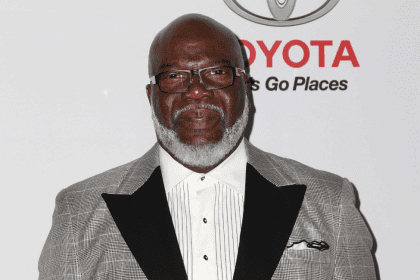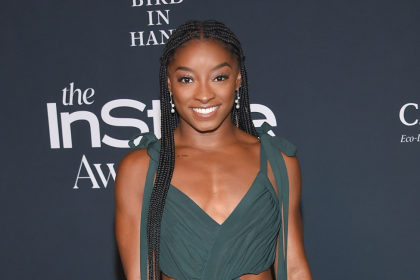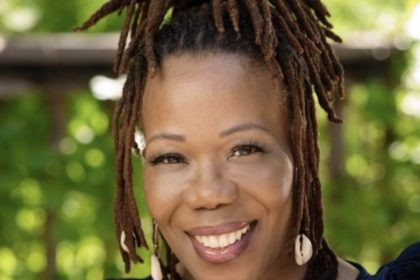Tomeka Hart
Vice President, African American Community Partnerships, Teach For America
What inspires you to show up to work everyday?
Teach For America’s vision is that one day, all children in this nation will have the opportunity to attain an excellent education. I have the awesome task of building authentic relationships in the African American community, working with a myriad of organizations and leaders committed to addressing the problems of educational inequity. Knowing this inspires me to show up every day and give my best!
How did you determine your career path?
I grew up in Memphis, in a low-income household. While I was a first-generation college student, my parents had the highest expectations for me, so I always knew I would go to college. I assumed that my school system provided me the best education possible and that I was competitive and prepared for college. Then, I entered college and began to take notice of the inequities in public education. I met students who attended schools offering multiple Advanced Placement courses — my high school only offered one. I met students who took courses in high school that my school didn’t offer — including calculus and foreign languages beyond Spanish. I did not understand how this could be and why it was so.
I wanted to make sure other students didn’t face what I had faced. I also wanted to be a lawyer. So I decided that I could do both eventually. After college, I taught school for five years, and then I left to pursue law school.
Two years after graduating from law school, I decided to mesh my passion for education and love of policy and I ran for the school board. I didn’t want to return to the classroom, but I still wanted to be engaged in community development through the education system. I served on the school board for nine years. My experience in the classroom and on the school board led me to realize that I wanted to dedicate my life’s work to community transformation through education reform.
Describe the future skillsets that are essential to future business leader and innovators?
While subject matter expertise is essential, leaders and innovators must have genuine passion for their work. They must be visionaries, who can see what others cannot, but who can help lead others in buying into and realizing the vision. Leaders and innovators have to be coaches, mentors, and role models, preparing the next wave of leaders to take on roles of greater responsibility. They have to be great followers, who are willing to listen to and consider others’ ideas, and who are not intimated by people who are as smart and driven as they are. They need great communication skills.
Describe why lifelong learning is important to you?
The world is in a perpetual state of change. Processes are constantly innovated. New data change circumstances. One can never be at a state of being wherein he/she knows all that he/she needs to know. I strive to know the best practices, the best efficiencies, the most effective methods of accomplishing goals. Leaders and innovators stay ahead of the curve and can anticipate and project into the future. The only way to have the skills for doing so, one must be a lifelong learner.
What are the 3 most important factors of being a successful woman?
Confidence/belief in yourself—that you have what it takes to do whatever it is you strive to do. Courage—you need to have no fear in making tough, at times unpopular decisions. You also need the courage to step out and take on leadership roles (see confidence/belief). Intellectual curiosity—you have to be a lifelong learner, always seeking the opportunity and the ways of learning more and more about our area of focus. By being intellectually curious, you’ll stand out as the leader with the expertise, innovation and vision.
If you could change one thing about the world what would it be?
All people would actually believe that ALL children can learn and deserve access to the absolute best education we can provide. People would understand the challenges and obstacles that students in low-income communities face. People would support doing whatever it takes to serve the needs of all students. Communities would have shared goals and values, and work together to educate our children.
Five rules for young women in business.
- Believe in your abilities
- Spend time getting to know and love yourself
- Remain intellectually curious
- Get mentors – women and men
- Be fearless and know that mistakes are a part of the journey
Name 3 most successful female role models and why.
Maxine Smith, Carol Johnson, Era Hart.
The late Maxine Smith was a civil rights activist and leader in Memphis—she’s a Memphis icon. While I never knew I could, as a young woman, she is the type of woman I wanted to be like. Mrs. Smith served on the Memphis City Schools Board, she ran the NAACP for years and she was a voice for civil rights and equality. She was well educated, bold, courageous, and mission driven.She was a change agent.
From her I learned to not be afraid to fight for what is right—even when it is unpopular and you may find yourself standing with few others.
Carol Johnson served as the superintendent of the Memphis City Schools when I was elected to the school board. Carol remains a mentor and friend today. Similar to what I observed in Mrs. Smith, Carol is a woman of high intellect, great vision, strength and courage. She taught me to be strong, yet fair.
Carol is remarkable at relationship building. I learned from her the power of relationships, and how to build them, even with people I may not agree with. Carol is a gentle giant. I still strive to be like her.
One of the strongest role models for me is my mother, Era Hart. Born and raised in the Jim Crow era of Memphis, my mother has a resolve that is remarkable. She worked multiple housekeeping jobs while raising and taking care of her family with my father (at 76, she still does today). Growing up it was amazing to see her go from servant at work, to this powerhouse of a woman in her private life. People seek her advice and she plays important roles in all of the above mentioned institutions. While she had a very difficult childhood, she makes no excuses and refused to believe she couldn’t provide a better life for her children.
She wanted the best for her children, and I didn’t appreciate how hard she had to work and how much she sacrificed so I could go to college. She had and still has little, but she has the biggest heart I’ve ever known. She started as a maid; she later bought a cleaning franchise and became an entrepreneur. My mother beat the odds. She encourages and challenges me still. I still strive to be like my mother.















